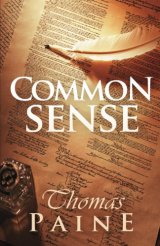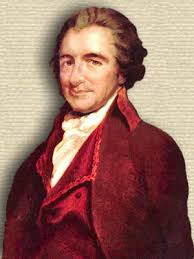Common Sense Page #18
Common Sense is a pamphlet written by Thomas Paine in 1775–1776 advocating independence from Great Britain to people in the Thirteen Colonies. Writing in clear and persuasive prose, Paine marshaled moral and political arguments to encourage common people in the Colonies to fight for egalitarian government.
The principles of Quakerism have a direct tendency to make a man the quiet and inoffensive subject of any, and every government which is set over him. And if the setting up and putting down of kings and governments is God's peculiar prerogative, he most certainly will not be robbed thereof by us; wherefore, the principle itself leads you to approve of every thing, which ever happened, or may happen to kings as being his work. Oliver Cromwell thanks you. Charles, then, died not by the hands of man; and should the present Proud Imitator of him, come to the same untimely end, the writers and publishers of the Testimony, are bound, by the doctrine it contains, to applaud the fact. Kings are not taken away by miracles, neither are changes in governments brought about by any other means than such as are common and human; and such as we are now using. Even the dispersion of the Jews, though foretold by our Saviour, was effected by arms. Wherefore, as ye refuse to be the means on one side, ye ought not to be meddlers on the other; but to wait the issue in silence; and unless ye can produce divine authority, to prove, that the Almighty who hath created and placed this new world, at the greatest distance it could possibly stand, east and west, from every part of the old, doth, nevertheless, disapprove of its being independant of the corrupt and abandoned court of Britain, unless I say, ye can shew this, how can ye on the ground of your principles, justify the exciting and stirring up the people "firmly to unite in the abhorrence of all such writings, and measures, as evidence a desire and design to break off the happy connexion we have hitherto enjoyed, with the kingdom of Great-Britain, and our just and necessary subordination to the king, and those who are lawfully placed in authority under him." What a slap of the face is here! the men, who in the very paragraph before, have quietly and passively resigned up the ordering, altering, and disposal of kings and governments, into the hands of God, are now, recalling their principles, and putting in for a share of the business. Is it possible, that the conclusion, which is here justly quoted, can any ways follow from the doctrine laid down? The inconsistency is too glaring not to be seen; the absurdity too great not to be laughed at; and such as could only have been made by those, whose understandings were darkened by the narrow and crabby spirit of a despairing political party; for ye are not to be considered as the whole body of the Quakers but only as a factional and fractional part thereof. Here ends the examination of your testimony; (which I call upon no man to abhor, as ye have done, but only to read and judge of fairly;) to which I subjoin the following remark; "That the setting up and putting down of kings," most certainly mean, the making him a king, who is yet not so, and the making him no king who is already one. And pray what hath this to do in the present case? We neither mean to set up nor to put down, neither to make nor to unmake, but to have nothing to do with them. Wherefore, your testimony in whatever light it is viewed serves only to dishonor your judgement, and for many other reasons had better have been let alone than published. First, Because it tends to the decrease and reproach of all religion whatever, and is of the utmost danger to society, to make it a party in political disputes. Secondly, Because it exhibits a body of men, numbers of whom disavow the publishing political testimonies, as being concerned therein and approvers thereof. Thirdly, Because it hath a tendency to undo that continental harmony and friendship which yourselves by your late liberal and charitable donations hath lent a hand to establish; and the preservation of which is of the utmost consequence to us all. And here without anger or resentment I bid you farewell. Sincerely wishing, that as men and christians, ye may always fully and uninterruptedly enjoy every civil and religious right; and be, in your turn, the means of securing it to others; but that the example which ye have unwisely set, of mingling religion with politics, may be disavowed and reprobated by every inhabitant of America. F I N I S. On Common Sense "No writer has exceeded Paine in ease and familiarity of style, in perspicuity of expression, happiness of elucidation, and in simple and unassuming language." Thomas Jefferson "A pamphlet called 'Commonsense' makes a great noise. One of the vilest things that ever was published to the world. Full of false representations, lies, calumny, and treason, whose principles are to subvert all Kingly Governments and erect an Independent Republic." Nicholas Cresswell "I dreaded the effect so popular a pamphlet might have among the people, and determined to do all in my Power to counteract the effect of it." John Adams "Its effects were sudden and extensive upon the American mind. It was read by public men." Dr. Benjamin Rush "Have you read the pamphlet Common Sense? I never saw such a masterful performance.... In short, I own myself convinced, by the arguments, of the necessity of separation." General Charles Lee
Translation
Translate and read this book in other languages:
Select another language:
- - Select -
- 简体中文 (Chinese - Simplified)
- 繁體中文 (Chinese - Traditional)
- Español (Spanish)
- Esperanto (Esperanto)
- 日本語 (Japanese)
- Português (Portuguese)
- Deutsch (German)
- العربية (Arabic)
- Français (French)
- Русский (Russian)
- ಕನ್ನಡ (Kannada)
- 한국어 (Korean)
- עברית (Hebrew)
- Gaeilge (Irish)
- Українська (Ukrainian)
- اردو (Urdu)
- Magyar (Hungarian)
- मानक हिन्दी (Hindi)
- Indonesia (Indonesian)
- Italiano (Italian)
- தமிழ் (Tamil)
- Türkçe (Turkish)
- తెలుగు (Telugu)
- ภาษาไทย (Thai)
- Tiếng Việt (Vietnamese)
- Čeština (Czech)
- Polski (Polish)
- Bahasa Indonesia (Indonesian)
- Românește (Romanian)
- Nederlands (Dutch)
- Ελληνικά (Greek)
- Latinum (Latin)
- Svenska (Swedish)
- Dansk (Danish)
- Suomi (Finnish)
- فارسی (Persian)
- ייִדיש (Yiddish)
- հայերեն (Armenian)
- Norsk (Norwegian)
- English (English)
Citation
Use the citation below to add this book to your bibliography:
Style:MLAChicagoAPA
"Common Sense Books." Literature.com. STANDS4 LLC, 2024. Web. 26 Nov. 2024. <https://www.literature.com/book/common_sense_270>.




Discuss this Common Sense book with the community:
Report Comment
We're doing our best to make sure our content is useful, accurate and safe.
If by any chance you spot an inappropriate comment while navigating through our website please use this form to let us know, and we'll take care of it shortly.
Attachment
You need to be logged in to favorite.
Log In